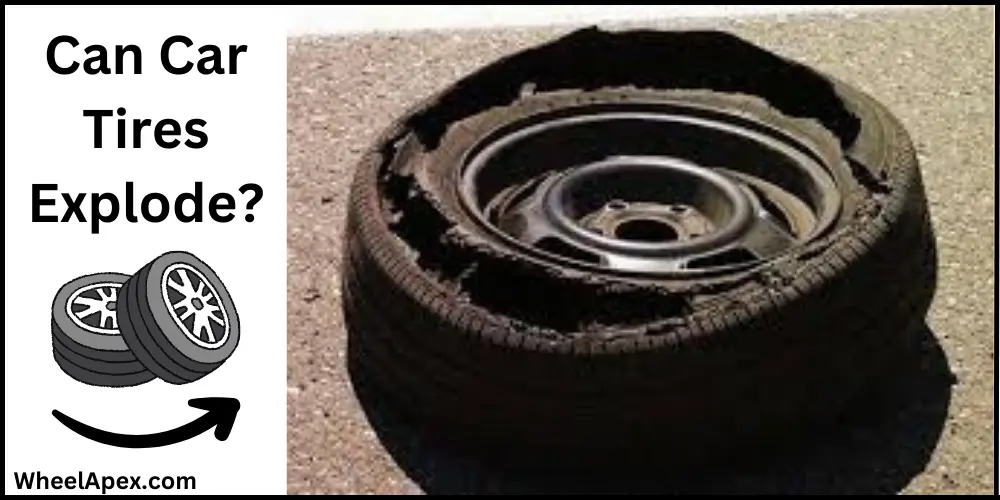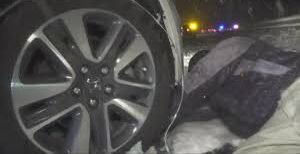Vehicle tires are fundamental parts that assume a pivotal part in guaranteeing protected and smooth transportation. While tires are intended to endure the tensions and requests of the street, there are occurrences where they can encounter a possibly risky peculiarity known as a tire blast. A tire blast can happen startlingly, bringing about a boisterous bang and unexpected loss of command over the vehicle.
Can Car Tires Explode? Grasping the causes, signs, and preventive estimates connected with tire blasts is of fundamental significance for each driver. In this article, we will dig into the entrancing yet disturbing subject of vehicle tire blasts, revealing insight into the elements that add to these episodes and giving significant bits of knowledge to assist you with remaining protected out and about.
Contents
Can Car Tires Explode?
Vehicle tires are a fundamental part of any vehicle, giving footing, strength, and well-being out and about. While tires are intended to endure the afflictions of ordinary driving, there are cases where they can encounter devastating disappointments, like blasts. Albeit moderately interesting, the potential for a tire to detonate presents dangers to drivers, travelers, and other street clients. In this article, we will investigate the elements that can add to tire blasts, the perils they present, and how to forestall such occurrences.
Yes, car tires can explode due to factors like overinflation, extreme heat, or damage, posing serious safety risks to drivers and passengers. Regular maintenance and proper inflation levels help mitigate this danger.
Figuring Out the Causes
- Overinflation:
One of the essential drivers of tire blasts is overinflation. At the point when a tire is expanded past the suggested pressure, the expanded pneumatic force puts unreasonable weight on the tire’s construction. This can debilitate the tire’s sidewalls, prompting a victory or blast.
- Underinflation:

On the furthest edge, underinflation can likewise add to tire blasts. At the point when a tire isn’t enough expanded, it creates inordinate intensity during delayed use. This intensity development can harm the tire’s inward parts, expanding the gamble of a victory or blast.
- Over-burdening:
Stacking a vehicle past its suggested weight limit overwhelms the tires. The overabundance of weight can make the tires overheat, prompting a likely blast.
- Harmed or Worn Tires:
Tires that are harmed, broken down, or have low-track profundity are more helpless to blasts. Points of weakness or penetrates in the tire’s construction can think twice about trustworthiness, making it inclined to disappointment, particularly under high paces or abrupt effects.
- Outrageous Temperatures:
Outrageous atmospheric conditions, like searing summers, can intensify the dangers of kenda tire blasts. Extreme intensity can make the air inside the tire extend quickly, possibly prompting a blast.
The Risks and Outcomes
A tire blast can have serious ramifications for both the driver and other street clients. The unexpected loss of control because of an extinguished tire can bring about mishaps, rollovers, or crashes, prompting wounds or fatalities. Flying tire trash can likewise present perils to people on foot and in different vehicles, causing extra mishaps and harm.
Avoidance and Security Measures
- Normal Support:
Guarantee customary tire upkeep, including checking the tire pressure, investigating for harm or wear, and keeping up with legitimate track profundity. Keep the producer’s rules for tire support and substitution stretches.
- Legitimate Filling:
Consistently keep up with the suggested tire pressure indicated by the vehicle maker. Utilize a dependable strain measure to check the tire pressure routinely, particularly in a little while on outings or while conveying weighty burdens.
- Load Limit:

Try not to surpass the most extreme weight limit suggested for your vehicle. Disseminate the weight uniformly and consider utilizing a rooftop rack or trailer while conveying curiously large or weighty things.
- Visual Review:
Regularly examine your tires for indications of harm, like cuts, lumps, or penetrates. On the off chance that you notice any irregularities, have the tires reviewed by an expert and supplant them if vital.
- Temperature Contemplations:
During warm climates, play it safe by leaving your vehicle in concealed regions whenever the situation allows. This lessens the development of intensity inside the tires, limiting the gamble of the blast.
FAQs
What Would Cause A Tire to Explode?
A tire can detonate because of overinflation, making unreasonable tension development inside. Penetrates, wear, or harm can debilitate the tire’s design, making it more defenseless to victories. Moreover, outrageous intensity, like delayed driving on hot streets, can prompt tire corruption and possible blasts. Standard upkeep is critical to forestall these dangers.
Can Car Tires Burst?
Vehicle tires can burst because of different factors like overinflation, underinflation, penetrates, or unreasonable mileage. At the point when a tire explodes, it can prompt loss of control and mishaps. Standard upkeep, legitimate filling, and staying away from street perils can assist with forestalling tire explodes and guarantee more secure driving.
Is it Safe to Over Inflate Car Tires?
Overinflating vehicle tires aren’t protected. An overabundance of tension can prompt diminished footing, a brutal ride, and an expanded chance of victory. It likewise adversely influences dealing with and can cause lopsided tire wear. Continuously follow the maker’s suggested tire tension for ideal security and execution.
How Common Are Tire Blowouts?
Tire victories are generally extraordinary however can happen because of different factors like underinflation, over-burdening, or tire harm. Customary upkeep, legitimate expansion, and keeping away from perils out and about can essentially decrease the gamble. While intriguing, it’s fundamental to stay cautious and ready for safe taking care of on the off chance that a victory occurs.
Conclusion:
Taking everything into account, while it is feasible for vehicle tires to detonate, such occurrences are somewhat interesting and can as a rule be kept away from with legitimate support and care. Understanding the variables that add to tire blasts, like overinflation, underinflation, or extreme wear, is urgent for guaranteeing street security.
Routinely checking tire pressure, keeping up with proper track profundity, and directing visual assessments can assist with forestalling possible issues. Moreover, abstaining from over-burdening the vehicle, staying away from abrupt effects or rapid moves, and driving inside suggested speed cutoff points can diminish the gamble of tire disappointment. By observing these rules and remaining cautious, drivers can limit the possibilities of tire blasts and guarantee a more secure driving experience for them and others out and about.
Sources:



